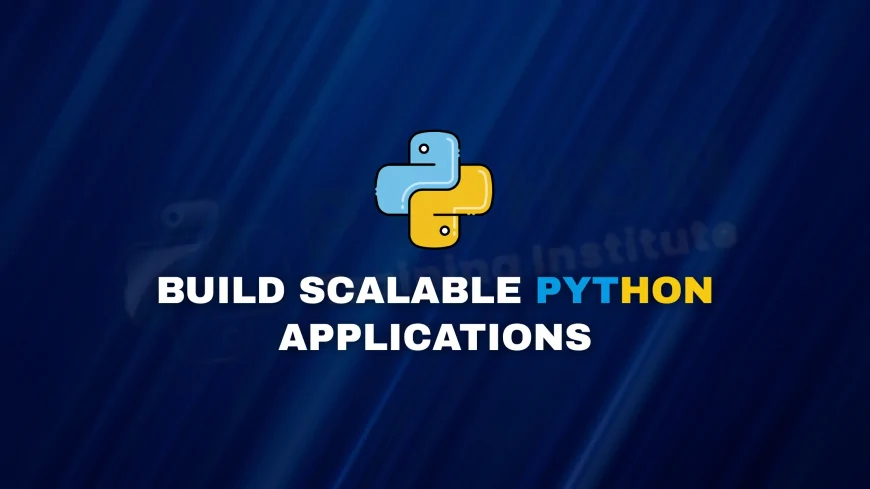Learn How to Build Scalable Python Applications Pune | Master Building Scalable Python Applications in Pune
Master building scalable Python applications in Pune with expert training. Learn best practices, frameworks, tools, and deployment strategies for scalable software development.

Table of Contents
- Introduction to Scalable Python Applications
- Why Building Scalable Applications Matters
- Benefits of Using Python for Scalable Apps
- Key Design Principles for Scalability
- Popular Python Frameworks for Scalability
- Essential Tools and Libraries
- Architectural Patterns to Scale Python Apps
- Database Choices and Management
- Deployment Strategies and Best Practices
- Optimizing Performance and Monitoring
- Common Challenges and Solutions
- Learning Path & Training Options in Pune
- Frequently Asked Questions (FAQs)
- Conclusion
Introduction to Scalable Python Applications
In the fast-paced digital world, applications need to handle growing user demands seamlessly. Building scalable Python applications means designing software capable of handling increasing loads while maintaining performance, reliability, and manageability. Python, with its extensive libraries and simplicity, serves as an excellent language to architect scalable solutions ranging from web applications to data processing systems.
Why Building Scalable Applications Matters
In today’s fast-evolving digital landscape, scalability is a critical factor that determines the long-term success of any software application. Scalable applications can efficiently handle increasing workloads and user demands without compromising performance, reliability, or user experience. Here’s why building scalable applications matters, especially when developing with Python:
1. Accommodating Growth:
Startups and businesses often experience rapid user growth. Scalable applications allow systems to handle more users, transactions, and data seamlessly. Without scalability, applications risk crashing, slowing down, or providing poor user experience as demand surges.
2. Cost Efficiency:
A well-designed scalable system optimizes resource usage. It ensures that computing power, storage, and bandwidth are used efficiently, which can reduce operational costs. Rather than over-provisioning from the start, scalable apps grow resources dynamically, saving money.
3. Enhancing User Experience:
Scalable applications maintain consistent performance under heavy loads. Users expect fast response times and uninterrupted service. Applications that scale well ensure smooth and reliable interactions, which fosters trust and retention.
4. Supporting Innovation and Flexibility:
Building with scalability in mind encourages modular and flexible architectures, such as microservices. This approach enables developers to update, expand, or modify parts of the application independently, accelerating innovation.
5. Competitive Advantage:
Businesses that can scale their applications quickly can respond better to market demands, new features, and competitor moves. Scalability allows companies to grow without being limited by technical constraints.
6. Future-Proofing:
Technology and user behavior constantly evolve. Scalable applications are designed to adapt to future challenges, such as integration with new technologies, increased data volumes, or shifting user patterns.
7. Reliability and Fault Tolerance:
Scalable applications often include redundancy and failover mechanisms. This design enhances system reliability, ensuring the application remains available even during spikes in traffic or unexpected failures.
Benefits of Using Python for Scalable Apps
Python’s clean syntax, rich ecosystem, and multi-paradigm nature make it ideal for scalable development:
-
Rapid Development:
Python’s simple syntax enables faster prototyping and iteration, helping developers quickly build and scale applications. -
Vast Libraries:
Extensive modules likeasynciofor concurrency,requestsfor networking, and frameworks such as Django and FastAPI accelerate scalable app development. -
Cross-platform Support:
Python runs efficiently on various platforms—servers, cloud environments, and edge devices—making deployment flexible and scalable. -
Community and Support:
An active global developer community provides abundant tutorials, tools, and best practices to help solve scalability challenges. -
Microservices Friendly:
Python’s modular design supports microservices architecture, allowing individual services to scale independently. -
Cloud Integration:
Seamless integration with cloud platforms like AWS, Google Cloud, and Azure simplifies deployment of scalable infrastructure.
Key Design Principles for Scalability
Building scalable Python applications requires adherence to certain fundamental design principles that ensure the system can grow efficiently while maintaining performance and reliability. Here are some essential principles to keep in mind:
1. Modularity:
Breaking your code into smaller, reusable components or modules makes development, testing, and maintenance easier. Modular code promotes separation of concerns, allowing different parts of the application to evolve independently without affecting others. This approach is key in scalable systems where different teams may work on separate modules.
2. Loose Coupling:
Reducing dependencies among modules ensures that changes in one part of the system do not cascade or break others. Loose coupling facilitates independent scaling, deployment, and updates of components. It also improves fault isolation, making the application more robust under load.
3. Statelessness:
Designing services that do not rely on internal state enables horizontal scaling. Stateless services can handle any request without needing information about previous interactions, allowing load balancers to distribute requests freely across servers. This principle is widely used in RESTful APIs and microservices.
4. Asynchronous Processing:
Using asynchronous programming techniques, especially for I/O-bound or long-running tasks, improves overall throughput and responsiveness. Python libraries such as asyncio, along with frameworks like FastAPI and Tornado, support async processing to handle multiple tasks concurrently without blocking the main thread.
5. Load Balancing:
Distributing incoming traffic evenly across multiple servers or instances prevents any single server from becoming a bottleneck. Load balancers monitor server health and route requests to ensure optimal resource utilization and high availability.
6. Caching:
Storing frequently accessed data temporarily in memory or distributed cache layers reduces the load on databases and improves response times. Techniques include in-memory caching with Redis or Memcached, and HTTP caching headers for web responses.
7. Scalability Testing and Monitoring:
Regularly testing the application under load and monitoring performance metrics help identify bottlenecks early and ensure smooth scaling. Tools like JMeter, Locust, and Prometheus are useful for this purpose.
Popular Python Frameworks for Scalability
Several Python frameworks facilitate building scalable applications:
- Django: A high-level framework with batteries included, suitable for scalable web apps with built-in ORM, caching, and security features.
- Flask: Lightweight and flexible, ideal for microservices and REST APIs.
- FastAPI: Modern, fast (high-performance) web framework for building APIs with async support.
- Tornado: An asynchronous networking library suitable for real-time apps requiring long-lived connections.
Essential Tools and Libraries
Tools that support building scalable Python apps include:
- Celery: Distributed task queue for asynchronous processing.
- Redis / Memcached: In-memory data stores for caching and messaging.
- Gunicorn / uWSGI: WSGI servers for handling Python web app requests.
- Docker: Containerization to enable consistent deployments.
- Kubernetes: Orchestration of containerized apps for scalability.
Architectural Patterns to Scale Python Apps
Several architectural approaches help scale Python applications effectively:
- Microservices Architecture: Splitting applications into smaller independent services that can be scaled individually.
- Event-Driven Architecture: Using events to trigger asynchronous workflows.
- Serverless Computing: Leveraging cloud functions to run code on demand.
- Load Balancing and Auto-scaling: Dynamically adjusting resources based on traffic.
Database Choices and Management
Choosing the right database is critical for scalable Python apps:
- Relational Databases: PostgreSQL and MySQL with replication and sharding.
- NoSQL Databases: MongoDB, Cassandra for flexible schema and horizontal scaling.
- NewSQL: Combines relational consistency with NoSQL scalability.
- Connection Pooling: Efficiently manage database connections to handle concurrency.
Deployment Strategies and Best Practices
Effective deployment is key to scalability:
- Containerization: Package apps with dependencies using Docker.
- Orchestration: Use Kubernetes for managing clusters of containers.
- CI/CD Pipelines: Automate testing, integration, and deployment.
- Blue-Green Deployment: Minimize downtime during updates.
- Monitoring and Logging: Track app health and troubleshoot issues proactively.
Optimizing Performance and Monitoring
Scalable apps require continuous performance tuning and monitoring:
- Profiling Tools: Use cProfile, Py-Spy to identify bottlenecks.
- Application Performance Monitoring (APM): Tools like New Relic, Datadog.
- Caching Strategies: Utilize CDN, Redis caches effectively.
- Load Testing: Simulate traffic to ensure app resilience.
- Logging and Alerts: Use ELK stack or Prometheus + Grafana for real-time insights.
Common Challenges and Solutions
Scaling Python applications comes with challenges such as:
- Global Interpreter Lock (GIL): Limits true multithreading; solve with multiprocessing or async programming.
- State Management: Stateless services and external storage for state.
- Database Scaling: Use caching, read replicas, and sharding.
- Network Latency: Optimize communication between microservices.
- Security: Secure APIs, data encryption, and authentication.
Learning Path & Training Options in Pune
Pune offers a variety of Python training programs focused on scalable app development:
- Comprehensive courses covering Python basics, advanced concurrency, and frameworks like Django and FastAPI.
- Project-based learning with real-world case studies and cloud deployment.
- Hands-on workshops on microservices, containerization with Docker & Kubernetes.
- Mentorship programs and placement assistance for career transition.
Institutes like Ethans Tech, SevenMentor, and Webasha Technologies are known for their scalable Python training offerings in Pune.
Frequently Asked Questions (FAQs)
1. What does scalability mean in Python applications?
Scalability refers to an application’s ability to handle increased load by adding resources or optimizing architecture without sacrificing performance.
2. Which Python framework is best for scalable apps?
Django is great for large-scale apps, while FastAPI is excellent for high-performance APIs. The choice depends on your specific needs.
3. How can I manage Python’s Global Interpreter Lock (GIL)?
Use multiprocessing, asynchronous programming, or external services to bypass GIL limitations for concurrent processing.
4. What databases are recommended for scalable Python apps?
PostgreSQL, MongoDB, Cassandra, and NewSQL databases are commonly used depending on the use case.
5. How important is containerization for scalability?
Very important; containers like Docker ensure consistent environments and easy scaling.
6. Can I learn scalable Python app development in Pune online?
Yes, many Pune-based institutes offer online live and recorded sessions to accommodate remote learners.
7. What role does caching play in scalability?
Caching reduces database hits and speeds up data retrieval, critical for handling high traffic.
8. Is microservices architecture necessary for all scalable Python apps?
Not always; smaller apps may scale well with monolithic designs, but microservices provide more flexibility for large systems.
9. How long does it take to learn scalable Python development?
Typically 3 to 6 months with dedicated learning and practice, depending on prior experience.
10. Are real-world projects included in these training courses?
Yes, project-based learning is a key component to apply concepts practically.
11. What tools help with monitoring scalable Python apps?
Tools like New Relic, Datadog, ELK Stack, Prometheus, and Grafana are commonly used.
12. Does Python support asynchronous programming?
Yes, Python supports async programming using libraries like asyncio, enhancing scalability for I/O-bound tasks.
13. Can I build both web and backend apps with scalable Python?
Absolutely, frameworks like Django and FastAPI allow scalable web and API backend development.
14. What deployment strategies are best for scalable apps?
Use container orchestration with Kubernetes, CI/CD pipelines, and blue-green deployments for minimal downtime.
15. How do I handle database scaling?
Techniques include read replicas, sharding, connection pooling, and using NoSQL databases where appropriate.
16. Are there any prerequisites to learning scalable Python development?
Basic Python programming knowledge and understanding of web technologies help, but many courses start from fundamentals.
17. How does Pune support learners in this domain?
Pune has vibrant tech communities, workshops, and reputed training centers focused on Python and scalability.
18. Can I specialize in a particular scalability domain?
Yes, you can focus on microservices, cloud deployment, database scalability, or performance optimization.
19. Is certification valuable after these courses?
Certifications from recognized institutes enhance your resume and job prospects significantly.
20. What career opportunities open after learning scalable Python apps?
Roles like Backend Developer, DevOps Engineer, Cloud Engineer, Software Architect, and Data Engineer become accessible.
Building scalable Python applications is essential for meeting growing user demands and business needs. Pune provides excellent learning environments where aspiring developers and professionals can master the skills needed to architect and deploy scalable solutions. With the right design principles, frameworks, tools, and continuous learning, you can build Python applications that perform reliably at scale and prepare yourself for a rewarding career in software development.
Conclusion
What's Your Reaction?
 Like
0
Like
0
 Dislike
0
Dislike
0
 Love
0
Love
0
 Funny
0
Funny
0
 Angry
0
Angry
0
 Sad
0
Sad
0
 Wow
0
Wow
0















